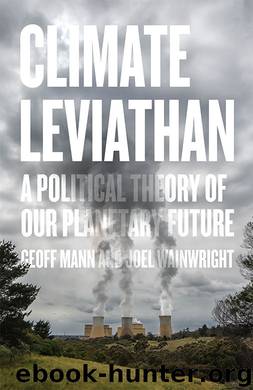Climate Leviathan: A Political Theory of Our Planetary Future by Joel Wainwright & Geoff Mann

Author:Joel Wainwright & Geoff Mann [Wainwright, Joel]
Language: eng
Format: azw3
Publisher: Verso Books
Published: 2018-02-13T05:00:00+00:00
6
Planetary Sovereignty
[Society] is gaining increasing control over its citizens but this control grows in tandem with the growth in its irrationality. And the combination of the two is constitutive … [T]he world is not just mad. It is mad and rational as well … The fact is that there is an authority that has the potential to prevent total catastrophe. This authority must be appealed to.
Theodor Adorno1
I
We believe the political is adapting to accommodate planetary sovereignty. The left half of our two-by-two heuristic (or “Punnett square”) in Figure 2.2 represents two broad trajectories along which our world might proceed: planetary sovereigns of capitalist and noncapitalist form, technically and spatially adequate to catastrophe-as-norm, justified by the need to save life on Earth. But what could facilitate the emergence of planetary sovereignty? How could we get from our “Westphalian” world to planetary management? (And might we get there in a way that somehow preserves the territorial nation-state?) In this chapter, we take up these questions. This will require us to proceed in conversation with students of international relations, where the prospect of a “world state” has been debated since the birth of the discipline. This will also involve some consideration of the philosophical sources of these debates, particularly Kant and Hegel. It may seem pedantic, but we hope to show that identifying the roots of contemporary thinking can provide a stronger basis for analyzing geopolitical changes to come.
The goal is not to predict the future. We cannot, of course, nor can anyone else. But, thanks to planetary climate change, most of us cannot help trying. Who hasn’t tried to anticipate what the world’s food and water will look like in thirty or a hundred years—and, more importantly, who hasn’t imagined how people will react to those conditions? What parent, on a scorching summer day, has not conjured up (usually with dread) their children’s or grandchildren’s future? And who on the Left has not dwelled, at least briefly, on how to ensure those dreadful futures do not come to pass?
On political and existential grounds, then, the Left needs a strategy—a political theory, one might say—for how to think about the future. It will no longer do to repeat Marx’s insight that all predictions of the future are at best idealist, at worst reactionary (though there is still much wisdom in it). For all its limitations, thoughtful speculation is analytically and politically superior to all the other options currently available: pretending everything is “normal”, embracing the false hopes peddled by techno-utopians, abandoning ourselves to nihilism (“we’re fucked”), or, worse still, validating the visions of the apocalyptic books and films that transmute our fears into spectacular, dystopian commodities. If there is a low bar against which we can measure thoughtful speculation, it is Hollywood’s aestheticization of anxiety and panic.
Careful speculation must be well-grounded, attentive and skeptical. Despite the best intentions, it is easy to succumb to simplistic and partial analyses. Even when thoughtful and well-informed scholars speculate regarding our climate-political futures, like Naomi Oreskes and
Download
This site does not store any files on its server. We only index and link to content provided by other sites. Please contact the content providers to delete copyright contents if any and email us, we'll remove relevant links or contents immediately.
Learning SQL by Alan Beaulieu(6283)
Weapons of Math Destruction by Cathy O'Neil(6270)
Digital Minimalism by Cal Newport;(5752)
iGen by Jean M. Twenge(5410)
Sapiens by Yuval Noah Harari(5368)
The Age of Surveillance Capitalism by Shoshana Zuboff(4287)
Elon Musk by Ashlee Vance(4123)
Thing Explainer by Randall Munroe(3932)
Apollo 8 by Jeffrey Kluger(3707)
Future Crimes by Marc Goodman(3596)
The Science Book (Big Ideas Simply Explained) by DK(3280)
The Innovators: How a Group of Hackers, Geniuses, and Geeks Created the Digital Revolution by Walter Isaacson(3178)
Who Can You Trust? by Rachel Botsman(3133)
I Live in the Future & Here's How It Works by Nick Bilton(2996)
Infinite Energy Technologies by Finley Eversole(2981)
Steve Jobs by Walter Isaacson(2896)
Dawn of the New Everything by Jaron Lanier(2770)
Chernobyl by Serhii Plokhy(2537)
Ben Franklin's Almanac by Candace Fleming(2528)
